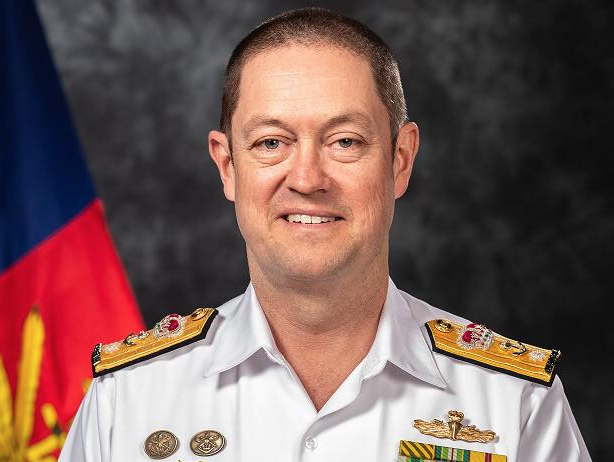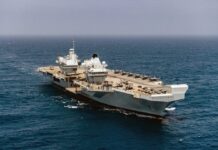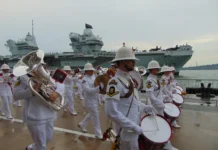
As newly elected President of the Australian Naval Institute I wish all our members, website subscribers, and more importantly our serving naval personnel a joyous Christmas and the best for 2024.
Of course, it is not a holiday for many of our serving defence personnel. Essential national security monitoring and essential maintenance work do not stop for holidays. Nor do national emergencies.
Cyclone Jasper has caused a significant turnout of defence personnel and materiel to meet the civilian demand.
That has, in turn, engendered debate about the civilian disaster role of Australian defence forces and assets. How it is funded and, given the rising climate crisis, how it should be structured in the future? It is a debate, like others, that the ANI willingly provides a platform.
But let us be clear, however that debate pans out, the commitment of naval personnel on the sea is unwavering.
That is perhaps best illustrated by the words of the captain of HMAS Brisbane, Commander Bernard Dobson, who said, “Mariners will go to great lengths to preserve safety of life at sea. We had no issues turning towards danger if it meant evacuating our fellow Australians from a tight spot. I am proud of my team for their quick response and the professional execution of the mission.”
He turned his vessel into the onslaught of Cyclone Jasper and deployed his naval helicopter to pluck the four civilian meteorologists off Willis Island and took them to safety.
This year has again seen a significant swing in focus to the role of the Royal Australian Navy in Australia’s maritime defence posture.
That has given rise to a number of significant debates. And the ANI, true its charter, has been a willing platform. How far out should the posture be? That question was tested with Australia declining to send a vessel to the Red Sea.
What about the long-term acquisition of naval assets. Very experienced naval voices have questioned the effectiveness of defence acquisition programs and, indeed, the very structure of the bureaucratic and pollical structures which make those determinations.
The ANI, obviously, does not take sides in these debates, but provides an important platform for them, because we believe that a lively contest of these views will result in a better outcome for Australia’s defence.
Not since the height of the Vietnam war or World War Two have defence issues been at the forefront of the public mind. We have had sonar attacks by Chinese vessels on our naval divers; we have had laser attacks on our pilots; we see the increasing vulnerability of strategic and trade passages by rogue drone attacks and climate change: Suez; Hormuz; the South China Sea; Panama.
I see a significant and continuing role for the ANI in the debate on these issues. But it must be a debate that leads to conclusions and results. It is not just an academic exercise. It is an exercise that has important implications for Australia’s national security. Importantly, the ANI will never be a platform for shrill, ill-informed, evidence-lacking diatribes.
I would now like to pay tribute to the work of my predecessor, Vice Admiral Peter Jones. As President of the ANI for the past decade, Peter led a complete overall in how the institute delivered its core function. He met the digital transformation head-on. Under his leadership the ANI largely moved from print, which from today’s perspective seems an obviously inefficient and expensive delivery of information and opinion. But he saw the need to change early and got on with it. As a result, the ANI delivers exponentially more information, analysis and opinion about the naval and maritime sphere to more people.
Peter also oversaw the launching of the Australian Naval Review, a printed publication for full members of the ANI.
Peter was also responsible for the inauguration of the Sam Bateman Prize for the best book of the year in the naval and maritime sphere. And from 2015 the Goldrick series of seminars & webinars (and it is with sadness that we mark the passing this year of long-time ANI councillor and towering naval commentator Rear Admiral James Goldrick); from 2016 the publication of the peer-reviewed Australian Naval Review; from 2016 the award of the McNeil Prize; in 2017 the ANI signed a Strategic Partnership Agreement with the Navy; from 2019 the publication of occasional papers and the judging of the CN’s Essay Competition; from 2020 the introduction of webinars in the face of Covid; from 2022 Themed Dinners to provide a forum for senior representatives of academia, Defence, the diplomatic corps, and industry. We also introduced the Saltwater Strategist podcast series.
This is a very hard act to follow, but I believe that with the increasing maritime and naval role in Australia’s defence and national security the ANI will play an ever more important role in informing not only people in the defence and strategy space but in the wider public.



